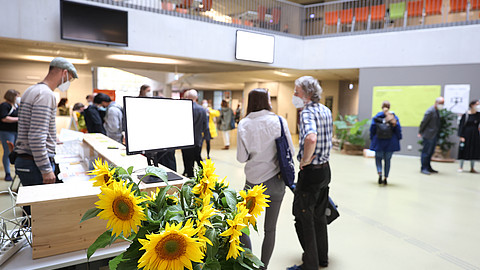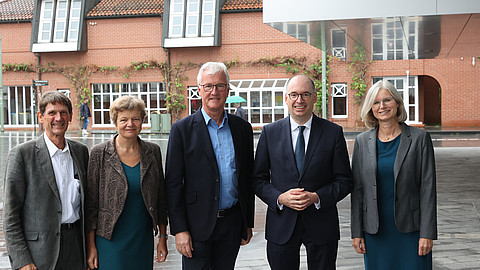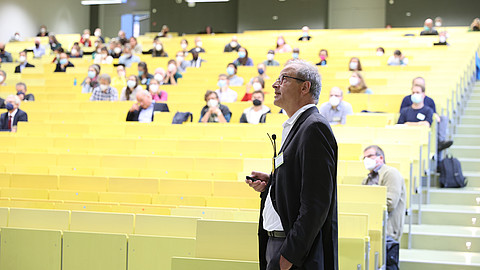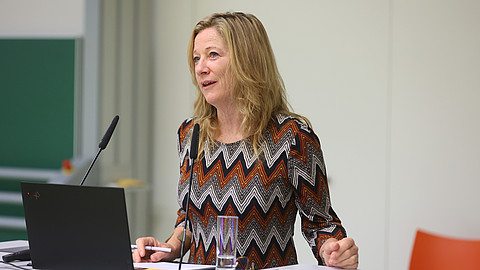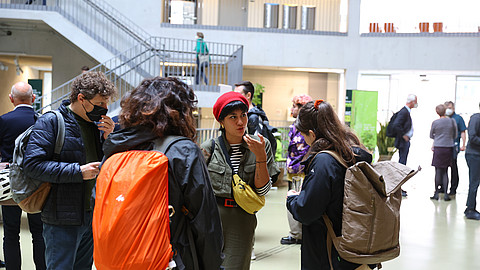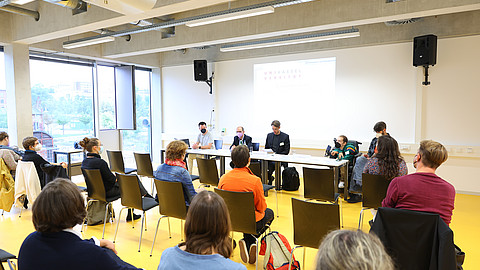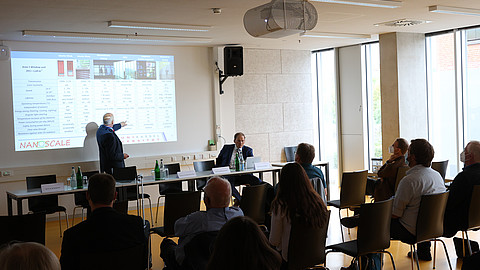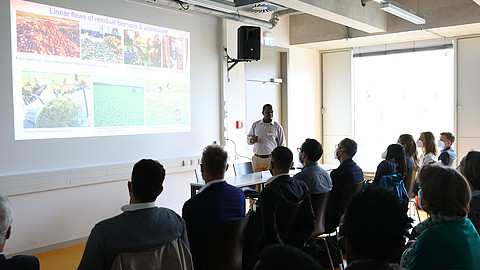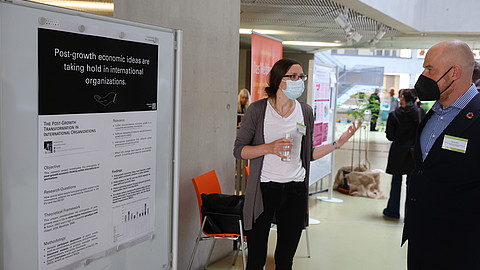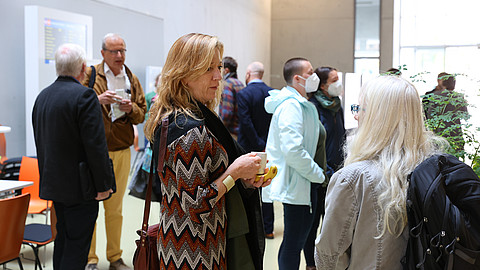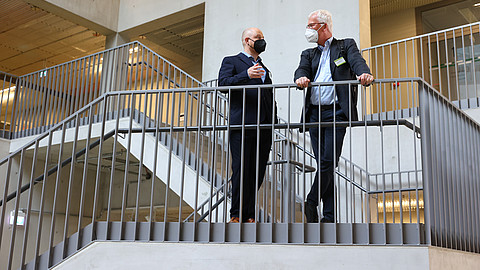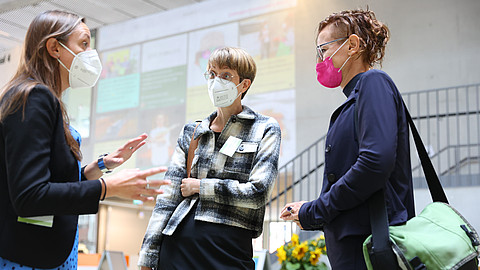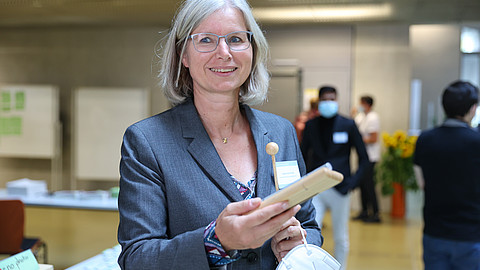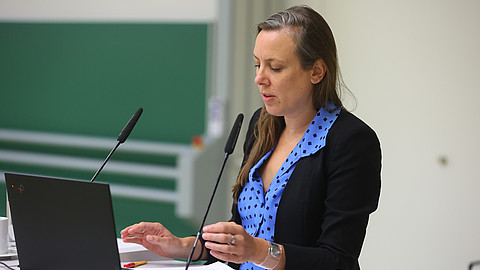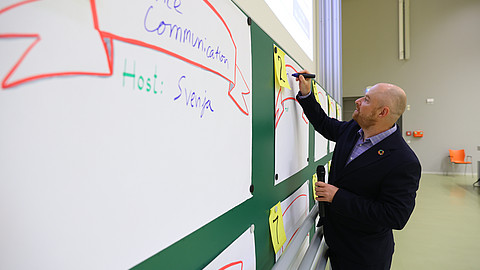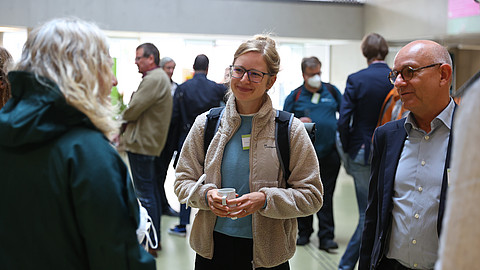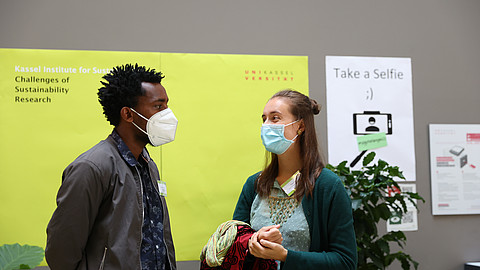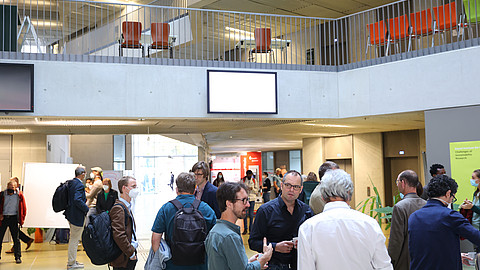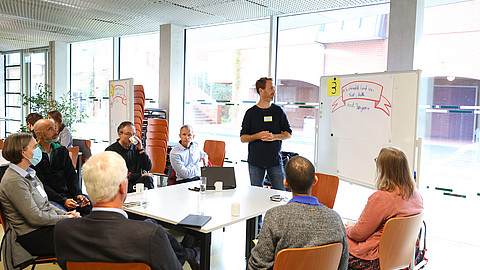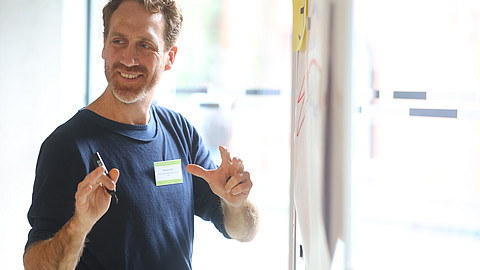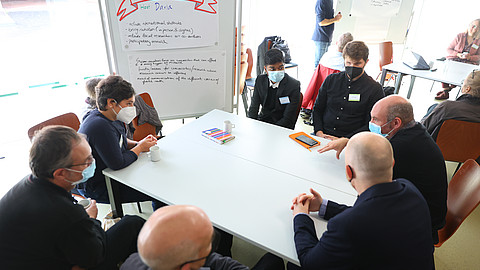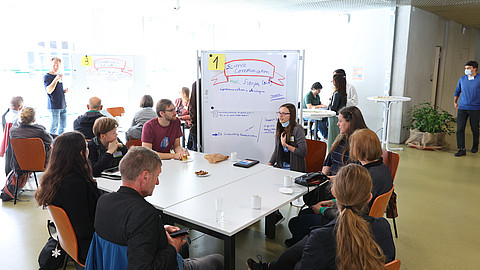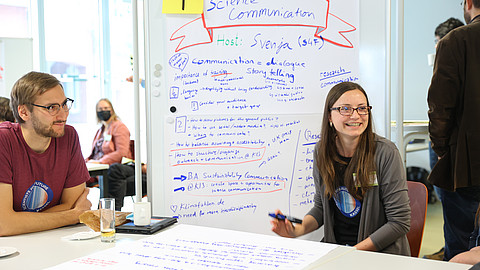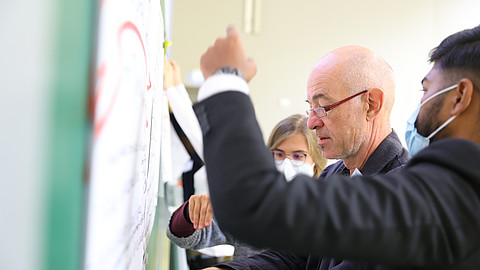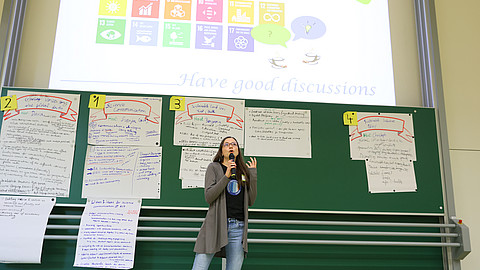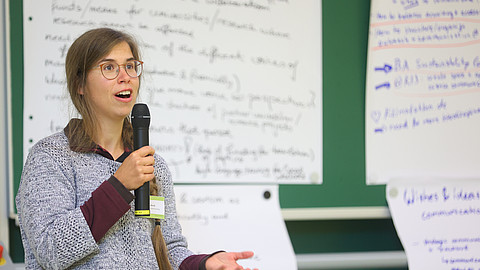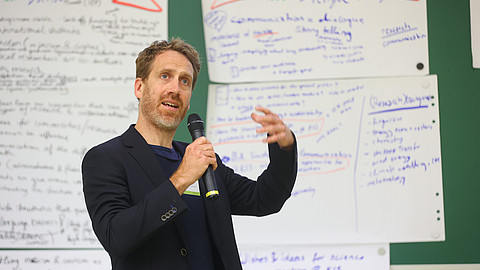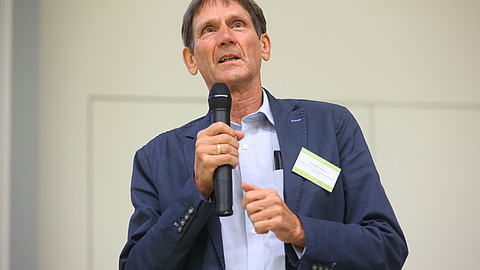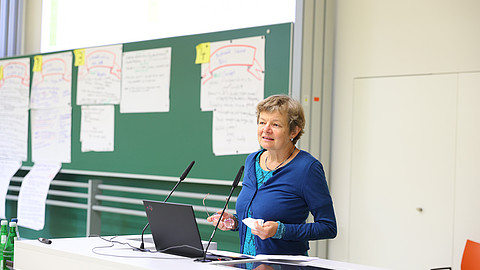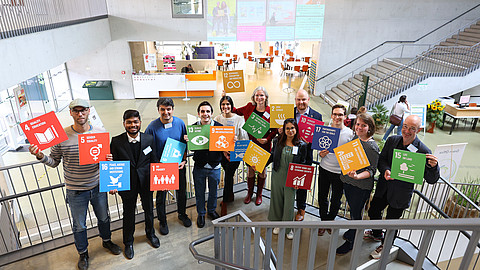Challenges of Sustainability Research | 14.-16. September 2022
Herzlichen Dank!
Dokumentation
Auftaktkonferenz
Um Chancen, Problematiken und Wirkungen der Transformation im Sinne der 17 UN-Nachhaltigkeitsziele und ihre Herausforderungen für die Wissenschaft geht es bei der ersten Konferenz des Kassel Institutes for Sustainability.
Eingerahmt von Keynotes zu den Eckthemen Natur, Technik, Kultur und Gesellschaft, bietet die Konferenz in insgesamt 25 verschiedenen Panels Vorträge und Diskussionen aus dem breiten Spektrum der Fragestellungen rund um die SDGs.
Im Open Space (Sustainability Research Café) diskutieren die Teilnehmer:innen der Konferenz ihre Vorschläge für die Forschung am Kassel Institute.
Inhalt
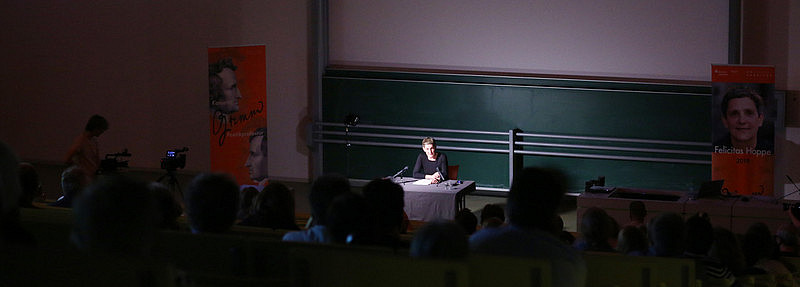 Bild: Andreas Fischer u. Stefanie Kreuzer
Bild: Andreas Fischer u. Stefanie KreuzerProgrammübersicht
| Mittwoch, 14.9. | Donnerstag, 15.9. | Freitag, 16.9. | |
| Vormittag | Keynote Panel 2 | Panel 5 Open Space | |
| früher Nachmittag | Begrüßung Keynote | Abschluss | |
| später Nachmittag | Panel 1 | Panel 4 Open Space | |
| Früher Abend | Additional lectures |
Weitere Fotos der Konferenz finden Sie hier
Fotogalerie
Keynotes
Folgende Persönlichkeiten konnten als Keynote-Speaker für die Eckpunkte Natur, Gesellschaft, Technik und Kultur des Kasseler Instituts gewonnen werden
- Janez Potočnik (UNEP, International Ressource Panel) | Mittwoch, 13:50 Uhr
The Role of Natural Resource Management in our Transition to a Sustainable Economy and Society
präsentiert von Stefan Bringezu - Elizabeth DeLoughrey (University of California, USA) | Donnerstag 9:00 Uhr
Mining the Seas: Speculative Fictions and Futures - Sara De Jong (University of York, UK) | Donnerstag 13:30 Uhr
(Un)Sustainable Lives
Additional lectures
Neben dem Hauptprogramm finden Sie hier Veranstaltungen, die im Kontext der Konferenz angeboten werden:
- Nordhessen – auf dem Weg zum „Sustainable Valley“? Wie Wissenschaft Transformationsprozesse in der Region mitgestalten kann | Daniel Opper | Mittwoch 17-18 Uhr
Plenum (HS 1) - Roundtable Discussion “Thinking with Bodies of Water” | Elizabeth DeLoughrey | Mittwoch 18-19:30 Uhr
MAMA Doc Space (documenta 15)
Begrüßung | 13:00 Uhr
Niels Annen (Parlamentarischer Staatssekretär bei der Bundesministerin für wirtschaftliche Zusammenarbeit und Entwicklung)
Ute Clement (Präsidentin der Universität Kassel)
Michael Wachendorf (Vizpräsident der Universität Kassel)
Martin Hein (Theologe, Ethiker, Bischof a.D., Moderator des Kasseler Klimaschutzrats)
Keynote | 13:50 Uhr | Janez Potočnik (UNEP, International Ressource Panel) ✺
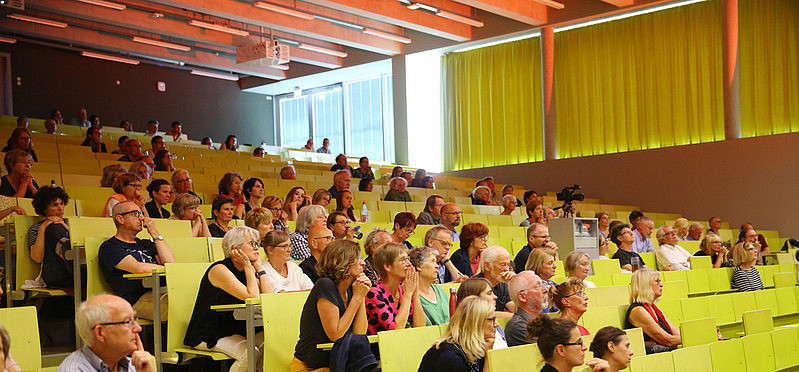
Leider kann Janez Potočnik seinen Vortrag wegen Krankheit nicht halten. Stefan Bringezu vom CESR, ebenfalls Mitglied des IRP, wird den Vortag auf Basis der Präsentation von Janez Potočnik halten.
► Presentation slides
We know from the work of the International Resource Panel that at the very heart of all the climate, environmental and human health challenges we face today are natural resources. The use of materials - fossil fuels, metals, minerals, and biomass - everything we extract from the Earth, has tripled since 1970; and without transformative change, it will double again by 2060. Decoupling growth in wellbeing and prosperity from natural-resource use and its impacts is a must. We should use fewer natural resources to meet human needs, in the first place in high-income countries, and we need to reject the assumption that these systems need to be so resource intensive.
The fundamental problem lies in current economic model. Humankind has never separated out economic growth from ever-rising demand for resources. As a result, we are now overstepping planetary boundaries, and locking ourselves out of the safe operating space in which human societies evolved. Supply side measures need to be complemented with demand-side measures and resource efficiency with sufficiency-based policies, to fully exploit the potential in our sustainability efforts and to get us closer also to the questions of responsibility and equity.
Panel 1 | 15:20-16:50 Uhr
Raum 1124
Environmental Footprints (EF) are increasingly being used as key performance indicators for assessing the ecological sustainability across scales from local to global. EF are applied in the assessment of environmental impact of products, services and infrastructures along the complete life cycle (LCA). Moreover, EF are used in the sustainability assessment and monitoring of economic sectors and nations. EF play also a growing role for measuring progress to policy goals such as the EU Green Deal, the Sustainable Development Goals (SDGs), or towards the Planetary Boundaries. The session will present the international state of knowledge on cross-scale environmental footprinting used to measure progress towards sustainability and pinpoint future policy applications and research needs.
Contributors:
- Product Environmental Footprint and Consumption Footprint to support the Green Deal: Serenella Sala, JRC Ispra ► Presentation
- From global Material Footprints to Product Material Footprints: Clemens Mostert, CESR ► Presentation
- EF and Global Mining: Spatially explicit analyses of worldwide raw material flows and associated environmental impact: Stefan Giljum, WU Vienna ► Presentation
- Timber footprints and benchmarks toward a balanced bioeconomy: Results and implications for Germany: Meghan Beck-O’Brien, CESR ► Presentation
- EF in Life Cycle Assessment: Water Scarcity Footprint: Anna Schomberg, CESR ► Presentation
Panel Coordinators: Stefan Bringezu, Clemens Mostert
Raum 1112
Based at the faculty of humanities of the University of Kassel, the research and teaching project Climate Thinking was founded by early career scholars in 2019 and further developed into an interdisciplinary research group in 2022. As a complement to natural science and technology based research traditions, we understand and analyze phenomena such as “climate change” and “environment” in terms of how they are constituted through language and embedded into culture. The interdisciplinary project focuses on three interwoven approaches with which to study discourses about the climate crisis and sustainability: Based on the assumption that the analyzed phenomena are embedded into complex relationships, we are interested in studying those interdependencies in which these are talked and thought about, as well as which stories are told about them.
Contributors:
- Martin Böhnert (IfPh),
- Paul Reszke (IfG),
- other institutes involved IfAA, IfR, IKTh, IEvTh,
Panel Coordinator: Martin Böhnert (IfPh), Paul Reszke (IfG)
Raum 1117/1118
It is only possible to contain the global climate emergency if there is a fundamental rupture with the dominant modes of production and consumption. Sometimes, this is presented as a trade-off between environmental protection and the need to defend the livelihoods of workers, in particular if industries are concerned that produce fossil fuels or rely on them. Strategies of change promoted by organised labour, for example ‘just transition’ or ‘socio-ecological transformation’, are based on the assumption that it is possible to phase out fossil fuels and trigger fundamental change while also protecting jobs, for example through processes of industrial conversion. We will discuss whether such strategies are viable, how they can be implemented, and what kind of challenges unions and political decision-makers are facing in the process.
Contributors:
- Renewable Energy Transition in Africa: The Role of Trade Unions, Simone Claar (University of Kassel)
- Trade Unionism, Solidarity Economy and Agroecology: The Case of the Chemical Workers Union of Campinas, Hugo Dias (State University of Campinas, Brazil)
- Workers, Trade unions and the Imperial Mode of Living: Labour Environmentalism from the Perspective of Hegemony Theory, Markus Wissen (Berlin School of Economics and Law)
- Labour’s Ecological Question: Voices from the Ground, Edlira Xhafa (Global Labour University Online Academy)
- Lisa Carstensen
Panel Coordinators: Simone Claar and Alexander Gallas (Chair)
Raum 1111
Achieving the Sustainable Development Goals (SDGs) and the goal from the Paris Agreement of a 1.5°C compliant economy will require immense investment and a corresponding redirection of capital flows toward sustainable economic activities and away from unsustainable activities. Therefore, the intersection of finance and sustainability, sustainable finance, has a key role to play in achieving the SDGs and will be central to future policy debates and research at the national and international level.
The aim of this panel is to provide an insight into the current state of research and policy on this topic and to derive an outlook on future research questions. Such a meeting should thus promote intra-university exchange and networking among the researchers involved. In addition, we also want to involve national and international researchers (and politicians) from outside the university in order to lay the foundation for future research work, research projects and research networks.
Contributors
- Sebastian Rink - Green and Sustainable Finance Expert (UNEP Collaborating Centre, Frankfurt School of Finance & Management): “Is the EU regulatory framework SDG-aligned?”
- Bernhard Zwergel (Unit Sustainable Finance, University of Kassel): “Retail investors' SDG preferences”
- Christoph Scherrer (Unit Globalization & Politics, University of Kassel): “Financing SDGs: Tax Not Debt”
Panel Coordinator: Gunnar Gutsche und Christian Klein
Raum 1110
Plants and other photosynthetic organisms provide life on Earth including humans with energy and food. A central process in these photoautotrophs is photosynthesis which can be exploited for hydrogen production as an alternative highly sustainable energy source. However, human well-being not only depends on the sustainable use of photosynthetic organisms. Plant biodiversity also has a value in itself that justifies its protection. In a densely populated country like Germany, it is decisive to integrate agricultural land use strategies in nature conservation efforts. Organic agriculture relies on ecosystem services provided by diverse ecological systems and therefore offers system-immanent protection of biodiversity along with provision of foods.
Contributors:
- Photosynthetic hydrogen production, Kirstin Gutekunst, Molekulare Pflanzenphysiologie, FB10, Biologie
- Plant biodiversity and nature conservation, Birgit Gemeinholzer, FB10, Biologie ► Presentation
- Ecological cultivation of plants, Miriam Athmann, FB11, Ökologischer Land- und Pflanzenbau, Ökologische Agrarwissenschaften
Panel Coordinator: Kirstin Gutekunst, Birgit Gemeinholzer, Miriam Athmann
Additional lectures | 17:00 - 19:30 Uhr
Ort: Plenum (HS 1)
Komplexe gesellschaftliche Fragen können heute nicht mehr von einer Disziplin oder Institution allein beantwortet werden. Dies gilt besonders für die großen Herausforderungen einer nachhaltigen Transformation von Wirtschaft und Gesellschaft.
In welcher Rolle sehen sich Hochschulen in diesem Transformationsprozess? Die Universität Kassel gibt hier eine klare Antwort: Als einzige Hochschule in Nordhessen sieht sie ihre Verantwortung darin, eine gestaltende Rolle in der Region einzunehmen.
Im zukünftigen „SDG+ Lab“ bei UniKasselTransfer sollen Wissenschaft, Zivilgesellschaft, Wirtschaft und Politik aktiv zusammengeführt werden, um nach dem Ansatz von „curating ideas in the making“ (Haus der Kulturen der Welt, Bernd Scherer) konkrete Nachhaltigkeits-Herausforderungen für die Region zu verhandeln und gemeinsam praktische Lösungen und Innovationen zu entwickeln, u.a. durch vier aufeinanderfolgende Themenjahre (Transformationen in Energie & Umwelt / Transformationen in Stadt & Land / Transformationen in Arbeit & Wirtschaften / Transformationen in Kultur & Zusammenleben), eine Campus Challenge und realweltliche Interventionen in Form von Reallaboren.
Welche Möglichkeitsräume eröffnen solche genuin transdisziplinäre, herausforderungsorientierte und partizipative Prozesse für Hochschulen? Versteht sich Nachhaltigkeitsforschung als grundsätzlich wirkungsorientiert? Und wie sollten transdisziplinäre Transferformate gestaltet sein, um die Brücke zu schlagen zwischen global ausgerichteter Nachhaltigkeitsforschung und sich regional immer stärker zeigenden Nachhaltigkeitsherausforderungen?
In dieser Additional Lecture möchten wir nach kurzen inhaltlichen Inputs bei Snacks und Getränken in den Dialog kommen zu den Chancen und Herausforderungen von transdisziplinärer Wissensproduktion und –integration zwischen Wissenschaft und Gesellschaft und so auch einen ersten Schritt in Richtung SDG+ Lab machen.
Der Additional Lecture wird organisiert von UniKasselTransfer.
Beitragende:
- Prof. Dr. Uwe Altrock, Dekan Fachbereich 06 (Architektur – Stadtplanung – Landschaftsplanung), Fachgebietsleitung Stadterneuerung und Planungstheorie sowie Chair des Themenjahrs „Transformationen in Stadt und Land“ im zukünftigen SDG+ Lab der Universität Kassel
- Daniel Opper, Leitung UniKasselTransfer und Initiator des SDG+ Labs
- Katharina Leinius, Bereich Gesellschaft bei UniKasselTransfer & inhaltliche Ausrichtung des SDG+ Labs
- Weiterer Gast (N.N.)
Ort: MAMA Doc Space
The roundtable discussion “Thinking with Bodies of Water”and the panel 4.1 "Extractive socities: cultural and artistic counter-movements" aims at an international and interdisciplinary scientific-artistic exchange on resource-based societies in the interconnectedness of the global South with Europe. The focus is on Latin America with its biodiversity and long (post)colonial experience of resource extraction, which will be negotiated in the artistic-discursive context of documenta fifteen in Kassel. The panel aims to open up interdisciplinary perspectives from the humanities and cultural studies and the arts for the socially relevant questions on the collectivity and sustainability of our ways of life and the radically changing ecosystems of the global present.
In the context of documenta fifteen, the panel takes up contemporary art and artistic practices as critical reflections of extractive societies that explore alternative ways of thinking and perspectives of action on coexistence and collectivity. The innovative approach is to elaborate the aesthetic and critical potential of the arts and humanities for cultural strategies of sustainability, using documenta fifteen in Kassel as a space for reflection.
Contributors:
- Elisabeth DeLoughrey (UCLA),
- Más arte más acción (MAMA), Colombia
Discussants:
- Liliana Gómez,
- Angela Schrott
Panel Coordinators: Liliana Gómez, Angela Schrott
Keynote | 9:00 Uhr | Elizabeth DeLoughrey (University of California, USA) ✺
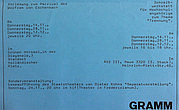
► This article outlines all relevant points of the presentation.
This presentation examines the recent oceanic turn in the humanities, particularly what Gaston Bachelard once termed the “depth imagination.” It stages an interdisciplinary conversation between recent scholarship about the speculative practices of Deep Sea Mining and speculative fiction that imagines techno-utopian futures of human life under the sea. In doing so it raises questions about the ways in which particular kinds of literary genres and reading practices produce an extractive imaginary, with a particular concern with the way in which terms like the “blue humanities” might trade in neoliberal discourses.
Panel 2 | 10:15-11:45 Uhr
Raum 1112
During the last two decades, Latin America experienced a commodity boom, and, once again, began to specialize in the extraction and export of natural resources. Regularly, natural resources create a vision of a prosperous and glorious future and therefore contribute to myths of development that go hand in hand with the extraction, appropriation, and exportation of natural resources.
The panel’s objective is to uncover and discuss these myths on various levels. In addition to the political, economic, and social dynamics this panel focuses also on cultural and discursive aspects related to the myth of development in Latin America. In this perspective, the panel embraces the ambiguities and contradictions of glorified futures that materialize in institutional settings, social configurations, and political discourses and thus contributes to demystifying these glorified futures.
Contributors:
- Juan Pablo Jimenez, FLACSO, Argentinien
- Cecilia Gárgano, UNSAM/CONICET, Argentinien
Discussant:
- Philipp Fehling (CALAS, Universität Kassel)
Panel Coordinator: Angela Schrott, Hans-Jürgen Burchardt, Hannes Warnecke-Berger
Die Diskussion kann wegen Krankheit leider nicht stattfinden.
Sie wird Anfang 2023 nachgeholt. Alle angemeldeten Teilnehmer:innen werden informiert.
For reaching the UN Sustainable Development Goals (SDGs), the World Bank estimates a gap of four trillion US-Dollar annually. According to its Maximizing Finance for Development approach, all sources of finance, including private sector money, must be attracted to closing the envisioned financing gap. Proponents of this approach claim that the “global pool of private money” can be mobilized for sustainable development through market-based financing instruments. Critics, however, claim that this strategy promotes a “financialization of development” which comes with high social, ecological and economic costs and risks, especially for marginalized social segments and countries from the Global South.
This panel provides a space to engage with this controversy from different perspectives by asking who benefits from financing sustainable development.
Contributors:
- N.N. (KfW),
- Daniela Gabor (UWE Bristol)
Panel Coordinator: Frauke Banse
Raum 1111
Part of the Sustainable Development Goals is to reduce inequalities and discrimination of persons with disabilities. In the last decade, the global movement for disability rights has worked strongly with the Convention of the Rights for Persons with Disabilities (CRPD). States have introduced monitoring processes to coordinate efforts of state and civil society on this behalf. Globally, millions of persons with disabilities live in poverty and are discriminated in their access to the full enjoyment of the rights to education, work and health. Sustainable Development has to include persons with disabilities. In the panel we will discuss the interdependence of Disability Rights and Sustainable Development.
Contributors:
- Kamil Goungor, European Disability Forum, Athens, “International Disability Organizations and the SDG Process”
- Judith Striek, German Institute for Human Rights, Berlin: “SDG and Human Rights Monitoring for Persons with Disabilities”
Panel Coordinators: Felix Welti, Markus Schäfers
Raum 1110
Urban areas around the world face numerous environmental and economic challenges in view of required reduction of carbon emission. The panel ”Sustainable management of urban residual biomass” will outline innovative approaches to establish integrative carbon and water management concepts in urban systems by considering residual biowaste as a resource. Different valorization routes for biowaste will be discussed from a quantitative sustainability and an urban transformation perspective. The use of residual biomass helps decrease fossil fuel dependency whilst simultaneously reducing the demand for additional biomass resource.
Contributors:
- CirCles - Circular economy of urban residual biomass via innovative utilization routes, Tobias Morck, FG Siedlungswasserwirtschaft;
- Integrated carbon and water management concepts for sustainable urban development - a perspective from the global south, Willis Gwenzi, University of Zimbabwe
- Sustainability assessment of biowaste valorisation routes, Thomas Astrup, DTU Environment, Denmark
- Decentralized biochar and activated carbon production from residual biomass for environmental applications and carbon storage, Susanne Veser, Björnsen Beratende Ingenieure (BCE)
Panel Coordinator: Tobias Morck
Raum 1117
Innovations in electrical engineering and computer science are considered key technologies for reducing CO2 and achieving related SDGs. Four research topics will be presented by members of the Faculty of Electrical Engineering and Computer Science of the University of Kassel:
- Smart glass for buildings and intelligent mobility: CO2 reduction, energy saving, personalized light, material resources saving and health promotion, Hartmut Hillmer
- „H2EASY“ – A project for the use of hydrogen as an energy carrier in commercial motor vehicles, Christian Nöding and Peter Zacharias
- Sustainable energy systems, Martin Braun
- Artificial intelligence as a key technology for achieving the SDGs, Bernhard Sick
Contributors:
- Hartmut Hillmer,
- Christian Nöding and Peter Zacharias,
- Martin Braun,
- Bernhard Sick
Panel Coordinator: Dirk Dahlhaus
Keynote | 13:30 Uhr | Sara De Jong (University of York, UK) ✺
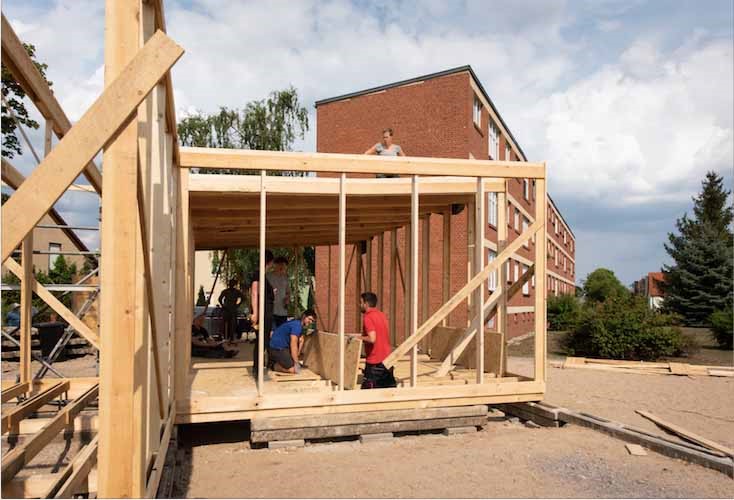 Bild: Uni Kassel.
Bild: Uni Kassel.► Presentation slides and speech
Whose lives are considered (un)sustainable both in line with the SDG agenda in relation to the so-called Global North and the South? This question is discussed using the example of two studies from Kenya and the United Kingdom.
Panel 3 | 14:30-16:00 Uhr
Raum 1112
The only option to influence climate change is pushing for a worldwide energy transition. This is one of the crucial objectives of the SDG agenda and it implies a global shift of the resource base both of production and consumption. In a nutshell, climate change signifies energy change, which translates into shifting patterns of raw material production and consumption. A global drive towards sustainability bears immense opportunities for many countries, the international system, and the world economy. However, this same claim to rapid, profound, and condensed social and ecological change in the Global North and the South also has a dark side, and these dark sides are often ignored or neglected. The panel places these dark sides at the core of the discussion and seeks to relink sustainability and energy transitions with uneven development both within societies as well as on an international level.
Contributors:
- Andreas Goldthau (IASS Potsdam)
Discussant:
- Rachid Ouaissa (Philipps-University of Marburg)
Panel Coordinator: Hans-Jürgen Burchardt, Hannes Warnecke-Berger
Raum 1110
European citizens who move within the European Union (EU) after retirement (may) face pension income insecurity or pension inadequacy. In principle EU social security law offers an extensive social protection of (relocating) pensioners: in a nutshell it can guarantee minimum old-age benefits. However, relevant provisions must first exist in the national laws that award a “minimum pension” or an “old-age minimum guaranteed income“. Furthermore, the differences both in the standard of living and in the amount of pension between the Member States still vary significantly. Against this background, numerous questions arise: Does for example the right to freedom of movement also apply to pensioners who move from one Member State to another but do not have “sufficient resources”? And are national benefits being provided to guarantee minimum income protection for the elderly and if so, how are they constructed? These and other questions shall be adressed by the present panel.
Contributors:
- Minou Banafsche (University of Kassel, Faculty of Human Sciences, Institute for Social Affairs, Chair of Public Law, especially Social Law),
- Stamatia Devetzi (University of Applied Sciences of Fulda, Faculty of Social and Cultural Sciences, Chair of Social Law),
- Hans-Joachim Reinhard (University of Applied Sciences of Fulda, Faculty of Social and Cultural Sciences, Chair of Social and Private Law),
- Olga Angelopoulou (Rechtsanwältin, Mediatorin der Organisation für Mediation und Arbitration, Athen)
Panel Coordinator: Minou Banafsche, Stamatia Devetzi
Raum 1117/1118
In times of multiple crises and strengthening imperial claims to power, the question of commonality, solidarity and cohesion must be posed anew. Commons stands for a cipher that refers to communitarian practices beyond capitalist rationalities as well as to struggles for autonomous cooperative spaces of work, economy, life and being. Commons are at the center of the (transnational) politics of contemporary social movements. In this respect, feminist struggles and care work are again of central importance today. In feminist struggles and forms of organization, among other things, reproductive labor was collectivized in order to protect each other from poverty and state violence. The "ollas communes" (common cooking pots) are internationally known. But autonomous, self-managed banking systems based on trust were also created, as well as community structures against the commercialization of nature (urban agriculture). Silvia Federici sees in these practices of "commoning" the material means of reproduction the primary mechanism through which bonding and collectivity are created.
The panel addresses the questions:
- How can commons and commoning be the basis of an anti-capitalist feminist program?
- What ambiguities and differences emerge in the practical interpretation of commons?
- How are feminist and capitalist-critical perspectives brought together and new perspectives created?
Contributors:
- Archana Prasad (JNU): "Recreating Common Spaces: Women in the Contemporary Peasant Resistance in Neoliberall India"
- Asanda Benya (UCT): "Feminist struggles and solidarities in South Africa’s platinum mining region"
- Eleonor Faur (UNSAM): "Who Cares for those who Care? Community Care Work in Pandemic Times"
- Akua Britwum (University of Cape Coast, Ghana): "Sustaining social reproduction in rural Ghana: Women contesting tenure regimes"
Panel Coordinator: Elisabeth Tuider
Raum 1111
In the planned panel the often neglected dimension of philosophical competence in the sustainability discourse will be put up for discussion. It will also debate how nature and sustainability need to be determined from a philosophical perspective in order to be able to develop an emancipatory perspective on the socio-ecological challenges of the present. Four short talks will be followed by a panel discussion, which will then be opened to the audience present.
Contributors:
- Alexandra Colligs
- Kristian Köchy
- Philip Hogh
Panel Coordinator: Dirk Stederoth
Raum 1124
The socio-ecological transformation is disruptively changing society and the world of work. The climate-induced change in social spaces has an impact on the world of work and lifestyles. The conflicts between social and ecological sustainability goals, which are emphasized in some places in the sustainability discourse, can obscure the view of their complementarities. In this panel we want to discuss conflicting objectives and moments of synergy in these discussion on the communal level.
Contributors:
- Jayeon Lindellee, Lund University, Sweden
She defended her doctoral thesis in 2018 at Lund University in Sweden, focusing on distributive consequences of changing unemployment benefit provision system in Sweden. She currently studies the role of civic participation in developing eco-social policies addressing ecological unsustainability and social inequalities at the same time.
Operationalizing sustainable welfare and co-developing eco-social policies via citizen engagement
How can we adapt our current social policy goals and welfare systems so that they can become catalysts for changes into ecologically and socially sustainable society? An ongoing research project in Sweden, Sustainable Welfare for a New Generation of Social Policy, aims at operationalizing the concept of “sustainable welfare” from a bottom-up perspective and co-developing ideas for eco-social policies via citizen engagement. In times of widening inequalities and political polarisation we argue that it is important to create common spaces for reflecting on what our fundamental needs are and how they can be satisfied in more sustainable ways. Besides presenting discussions and policy proposals resulted from our deliberative citizen forums, a population survey, and ongoing policy forums, the presentation will also focus on the role of researchers in transition processes for an ecologically and socially just future. - Anke Freuwört, Univesity of Kassel
She worked several years as a researcher at the University of Kassel in the areas of „socialization and intercultural education with a focus on migration“ and the area of „Right of childhood and adolescence“ She is currently writing her dissertation on political participation of migrants and refugees. Her latest publications are on „the critical judgement about political participation of migrants and refugees“ or the „democratic legimitacy and political plurality of foreigners' advisory councils“. Both papers will be published soon in German.
„Social sustainability without political participation? How migrants shape society“
Social sustainability requires extensive citizen participation. As migrants in Germany are partially limited in their political rights due to citizenship, deficits in formal co-determination and implementation of the SDGs rise. Political positions can instead be expressed non-formally through migrant organizations and informally through foreigners' advisory councils
Panel Coordinator: Stefanie Hennecke, Andreas Eis
Panel 4 | 16:30-18:00 Uhr
Findet am Mittwoch, 18-19:30 Uhr im Rahmen des Additional Lecture Roundtable Discussion »Thinking with Bodies of Water« im MAMA Doc Space (documenta 15) statt.
The roundtable discussion “Thinking with Bodies of Water”and the panel 4.1 "Extractive socities: cultural and artistic counter-movements" aims at an international and interdisciplinary scientific-artistic exchange on resource-based societies in the interconnectedness of the global South with Europe. The focus is on Latin America with its biodiversity and long (post)colonial experience of resource extraction, which will be negotiated in the artistic-discursive context of documenta fifteen in Kassel. The panel aims to open up interdisciplinary perspectives from the humanities and cultural studies and the arts for the socially relevant questions on the collectivity and sustainability of our ways of life and the radically changing ecosystems of the global present.
In the context of documenta fifteen, the panel takes up contemporary art and artistic practices as critical reflections of extractive societies that explore alternative ways of thinking and perspectives of action on coexistence and collectivity. The innovative approach is to elaborate the aesthetic and critical potential of the arts and humanities for cultural strategies of sustainability, using documenta fifteen in Kassel as a space for reflection.
Contributors:
- Elisabeth DeLoughrey (UCLA),
- Más arte más acción (MAMA), Colombia
Discussants:
- Liliana Gómez,
- Angela Schrott
Panel Coordinators: Liliana Gómez, Angela Schrott
Raum 1117/1118
The panel will address three pertinent questions for sustainable industrial policies:
- What kind of industrial policies are required for an ecologically and socially sustainable economy?,
- In what ways does global economic governance has to change to allow for sustainable industrial policy?,
- How can the implementation of industrial policies be improved and what role can trade unions play in overcoming domestic resistance?
Contributors:
- Bruno de Conti (Universidade Estadual de Campinas),
- William Baah-Boateng (U of Ghana),
- Zeynep Nettekoven (House of Labor),
- Hansjörg Herr (Berlin School of Economics and Law),
- Stefan Gold (U Kassel)
Convenor + Moderator: Christoph Scherrer
Raum 1124
Land use relates to a number of different UN Sustainable Development Goals (SDGs). Analytical tools to explore trade-offs and synergies between these goals are scenarios and simulation models. The Panel focuses on two case studies:
- Land use in Western Amazonia and tipping points of social-ecological systems;
- Land-based climate mitigation technologies and their trade-offs with food production.
In the first part, four presentations introduce the case studies and explain the respective application of scenarios and models. Second part is a Panel discussion that centres round the potential role of these analytical tools for policy-making and for developing pathways to a more sustainable land use.
Contributors:
- Western Amazonia: Regine Schönenberg (FU Berlin), Benjamin Stuch (Uni Kassel)
- Land-based mitigation: Annemarie Klaasse (eLEAF), Janina Onigkeit (Uni Kassel)
Panel Coordinator: Rüdiger Schaldach, B. Stuch
Raum 1112
In recent years, more and more critical debates addressed limits, pitfalls and problems of the Sustainable Development Goals of the United Nations. Scholars argued that the SDGs had certain blind spots regarding power relations, that were Eurocentric, reproduced old fashioned linear Western concepts of development, ignore debates about participation and empowerment in development theory and effectively reaffirm the promise of 'development' designed to justify a capitalist world order producing ever greater inequalities. The contributors of the panel will reflect upon these critical positions and explore alternative, global and less hierarchical ways of sustainability.
- "SDGs from a postcolonial perspective" (Denk)
- "Beyond the Decent Work Agenda. Sustainable Development and Labour seen from a Social Reproduction-Perspective" (Carstensen)
- "SDGs from a Marxist/Buddhist perspective" (Pillay)
Contributors:
- Devan Pillay (live via internet South Africa, Wits University),
- Albert Denk (LMU München),
- Lisa Carstensen
Panel Coordinator: Hubertus Büschel, Elisabeth Tuider, Aram Ziai
Raum 1111
With the spread of digital technologies, new market structures are emerging that on the one hand promise more sustainability, but on the other hand can also lead to undesirable negative side effects due to unclear governance structures and depending on the concrete implementation and use. Digital platforms have the potential to drive a change toward greater sustainability in the sense of reducing environmental pollution, energy and resource consumption, or improving working conditions. Especially in the area of informal markets, many platform initiatives can be found whose motivation is a transformation toward sustainable development. Despite their positive intentions, the realization of the sustainability potential of initiatives such as "Kolekt", the "Plastic Bank" app or the Grameen Bank is linked to prerequisites and conditions and raises some sustainability-related questions, such as:
- Who is allowed to participate and who is excluded?
- How is the trustworthiness of the platform ensured?,
- How is opportunism contained?,
- How is "infiltration" by non-sustainable providers prevented?
Contributors:
- Fostering social sustainability through value-sensitive and participatory IT design approaches,
Claude Draude (Uni Kassel, FB 16, ITeG) - Sustainable human-AI collaboration in organizations through hybrid intelligence,
André Hanelt (Uni Kassel, FB 07) & Mathias Söllner (Uni Kassel, FBs 07 & 16, ITeG) - Authoritarianism, Oligarchy, Localism, or Democratization? Alternative Futures for Platformization,
Zlatko Bodrožić (University of Leeds) - Overcoming Salience Bias: Using Real-Time Feedback to Achieve Sustainable Behavior,
Verena Tiefenbeck (Friedrich-Alexander-Universität Erlangen-Nürnberg) - The Role of IS for Circular Economy,
Johann Kranz (LMU München)
Panel Coordinator: Ralf Wagner
Open Space | 18:15 Uhr
Marktplatz
Plenum (HS 1)
Panel 5 | 9:00-10:30 Uhr
Raum 1110
SDGs and Global health: Biomedical solutions for social challenges?
Global health is high on the international political agenda. It relates to transnational health issues, determinants, and solutions; involves many disciplines within and beyond the health sciences and requires interdisciplinary collaboration. The recent COVID-19 pandemic, which can be considered a global health challenge per se, exhibited essential deficits in global health policy. The predominant focus was put on biomedical approaches and solutions, while other disciplines were widely ignored or neglected. Biomedical reductionism, however, falls short vis-à-vis the global health challenges emerging from the non-medical social, political, economic and environmental determination of health, especially also regarding SDGs.
Contributers:
- Jens Holst (Fulda University of Applied Sciences)
- Margret Keraka (Kenyatta University)
- Remco van de Pas (University of Antwerp)
- Rüdiger Krech (WHO)
Panel Coordinator: Heiko Jahn (Universtät Kassel), Kai Michelsen (Fulda University of Applied Sciences)
Raum 1111
Despite the progress made to produce enough food that can feed everyone in the world, in 2020, an estimated 768 million people suffered from chronic hunger.[1] After few years of relative neglect of the agri-food system by policy makers, the soaring of food prices back in 2007/2008 and 2010, necessitated the re-emergence of vulnerability to food insecurity as central concern of the international and national policy agendas. Since then, a series of events, including recurring weather extremes due to intensifying effects of climate change, COVID19 pandemic, armed conflicts, and most recently the war in Ukraine, all highlight the dramatic urgency to improve resilience and sustainability of globalized agri-food systems worldwide. But what does that mean, and how does it play out on the ground?
This panel discusses the extent of the challenge and coping strategies of countries in northern and eastern Africa. Countries were severely hit by these multiple shocks and stresses and need to address food shortages and supply chain problems that have remerged with great urgency due to the war on Ukraine and related export bans, blockades, and the expected reduction of production of certain commodities. While some actors in the field, including the Food and Agriculture Organization of the United Nations (FAO), have begun to promote agroecology to improve resilience and sustainability, other voices call for intensified conventional production to ‘feed the world’. The panel is interested to understand the type of agri-environmental transformations that were politically intended and occurring, and whether, how and why these need to be re-evaluated in the context of the current crisis. Moreover, it aims to unravel the implications for resilience and sustainability of the food systems in these regions? Findings of the discussion aim to sketch a research agenda around building resilience and sustainability of food systems from the viewpoint of sustainable agriculture.
[1] FAO. 2021. The Sate of Food and Agriculture 2021: Building resilience agri-food systems. FAO, Rome
Contributors:
- Ariane Götz
- Ayalneh Bogalé
- Andreas Thiel
- Rami Zurayk
Panel Coordinator: Ariane Götz
For a socio-ecological transformation, individual action matters on various levels and in various ways. In our interdisciplinary symposium, we highlight and compare different roles in which individuals contribute to building a more sustainable future, integrating psychological, sociological, and political science views. We start from individual psychological insights into drivers and barriers for private sustainable action and extend this to other levels and contexts. The interaction of individuals and their environment shapes individual action in social environments as well as in economic or physical environments. Even on a macro level, individuals are involved in shaping political and economic conditions within which individual behavior ultimately takes place. Thus, it becomes evident that on the broad range from the private individual sphere to the urgently needed macrostructural changes, it is ultimately individual psychology that drives behavior and decisions towards a sustainable socio-ecological transformation. With our symposium we aim to strengthen the notion that transforming systems necessarily requires a thorough, interdisciplinary understanding of individuals and their reasons for behavior. We will conclude our session with a moderated open discussion with all panelists and the audience.
Contributors:
- Andreas Ernst (Chair for Environmental Systems Analysis and Environmental Psychology, CESR, University of Kassel), ► Presentation
- Laura Henn (CESR, University of Kassel), ► Presentation
- John Thøgersen (Chair for Economic Psychology, Aarhus University), ► Presentation
- Marlene Batzke (CESR, University of Kassel), ► Presentation
- Sophia Becker (Chair for Sustainable Mobility and Transdisciplinary Research Methods, Vice president, Technical University Berlin),
- Matthias Kranke (Globalisation and politics, University of Kassel) ► Presentation
Panel Coordinator: Laura Henn, Andreas Ernst
Raum 1117
The panel connects to our work in the research network “sustainable intelligence – intelligent sustainability”, initiated by ITeG and the Hessian Centre Responsible Digitality (ZEVEDI). In this research network, we focus on the operational (e. g. political, scientific, and technological) logics, actions, and framings of the SDGs, thus contributing to the analysis of the relation between digitality and sustainability. ► Abstract
In the panel, we will discuss three interconnected topics that link our research endeavors:
- "Digital Sustainability": Negotiating Sustainability in Digital Society (Carsten Ochs) ► Presentation
- The Politics of Digital Infrastructure – Sustaining the Unsustainable by Google’s Design (Florian Müller & Markus Uhlmann)) ► Presentation
- The Eco-Logics of Smart Electrification: Cosmologies and the Hegemonic Tendency of Cybernetic Sociotechnical Thinking (Jörn Lamla & Jakob Roschka)) ► Presentation
Respondents will be:
- Claude Draude (Faculty 16, University of Kassel)
- Gerrit Hornung (Faculty 7, University of Kassel)
- Johanna Leinius (Goethe-University Frankfurt am Main)
Panel Coordinator: Jörn Lamla, Carsten Ochs
Raum 1124
Sustainable Energy Supply is a core competence at the University of Kassel together with the Fraunhofer Institute of Energy Economics and Energy System Technology.
Clean and affordable energy is fundamental for many other SDGs. Since more than 30 years, the University of Kassel and the Fraunhofer IEE are pioneering energy supply based on renewable energies.
Presentations and discussions will be organized around the following key questions?
- How can clean and secure energy supply be fundamental for reaching many other SDGs?
- What are the major challenges and solutions towards sustainable energy systems? (today only 15% of the global energy consumption is based on renewable energies)
- What are major contributions from the University of Kassel and Fraunhofer IEE?
- How can interdisciplinary approaches create new solutions?
Contributors
- Martin Braun (Uni Kassel, Fraunhofer IEE): Research for Sustainable Energy Systems at the University of Kassel & Example on Power Grids
- Ulrike Fuchs (Fraunhofer IEE): Research for Sustainable Energy Systems at the Fraunhofer IEE in Kassel
- Kaspar Knorr (Fraunhofer IEE): 100% Renewable Energy Supply Systems
- Ulrike Jordan (Uni Kassel): 100% Thermal Energy Systems
- André Baier (Fraunhofer IEE): Digitalisation and Artifical Intelligence for Sustainable Energy Systems
- Klaus Träbing (Uni Kassel): Hydro Power and Sustainability Assessment
Panel Coordinator: Martin Braun
Open Space | 10:45 Uhr
Sustainability Research Café
Abschluss | 12:25 Uhr
Resümee, Ausblick, Ankündigungen
Ende | 13:00 Uhr
